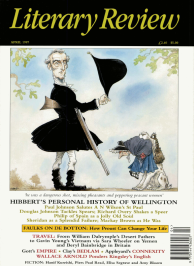Sebastian Faulks
Highly Enjoyable Proustatectomy
How Proust Can Change Your Life
By Alain de Botton
Picador 208pp £12.99
From the title and the chapter headings, this promises to be a very irritating book indeed: superfluous, semi-biographical criticism of a canonical author dressed up in nudging 'irreverence' from the student bar, like Travesties without the drama, or Monty Python twenty-five years too late.
Alain de Botton has written a meditation on aspects of Proust presented in the form of a self-help book, so that the chapter entitled 'How to Be Happy in Love', for instance, considers what Proust had to say about the subject in his novel, how his characters fared, how this differs from his personal experience and what moral – both aesthetic and practical – the rest of us can draw from it. The tone is playful; the conclusion is that 'even the finest books deserve to be thrown aside'.
Why has de Botton chosen this potentially infuriating form to write about an author he clearly admires and about whose life he is well informed? A desire to fool around or a real conviction that this method can yield results a more traditional one could not? Only he can say what his motives were; and only we can say whether the result is a success.
I think it is, though the reason it works well seems a quite old-fashioned one. If you have been excited by a long chess match, you don't just read the short news story of the result in the paper; you can take any amount of analysis and discussion with friends.
If

Sign Up to our newsletter
Receive free articles, highlights from the archive, news, details of prizes, and much more.@Lit_Review
Follow Literary Review on Twitter
Twitter Feed
Under its longest-serving editor, Graydon Carter, Vanity Fair was that rare thing – a New York society magazine that published serious journalism.
@PeterPeteryork looks at what Carter got right.
Peter York - Deluxe Editions
Peter York: Deluxe Editions - When the Going Was Good: An Editor’s Adventures During the Last Golden Age of Magazines by Graydon Carter
literaryreview.co.uk
Henry James returned to America in 1904 with three objectives: to see his brother William, to deliver a series of lectures on Balzac, and to gather material for a pair of books about modern America.
Peter Rose follows James out west.
Peter Rose - The Restless Analyst
Peter Rose: The Restless Analyst - Henry James Comes Home: Rediscovering America in the Gilded Age by Peter Brooks...
literaryreview.co.uk
Vladimir Putin served his apprenticeship in the KGB toward the end of the Cold War, a period during which Western societies were infiltrated by so-called 'illegals'.
Piers Brendon examines how the culture of Soviet spycraft shaped his thinking.
Piers Brendon - Tinker, Tailor, Sleeper, Troll
Piers Brendon: Tinker, Tailor, Sleeper, Troll - The Illegals: Russia’s Most Audacious Spies and the Plot to Infiltrate the West by Shaun Walker
literaryreview.co.uk